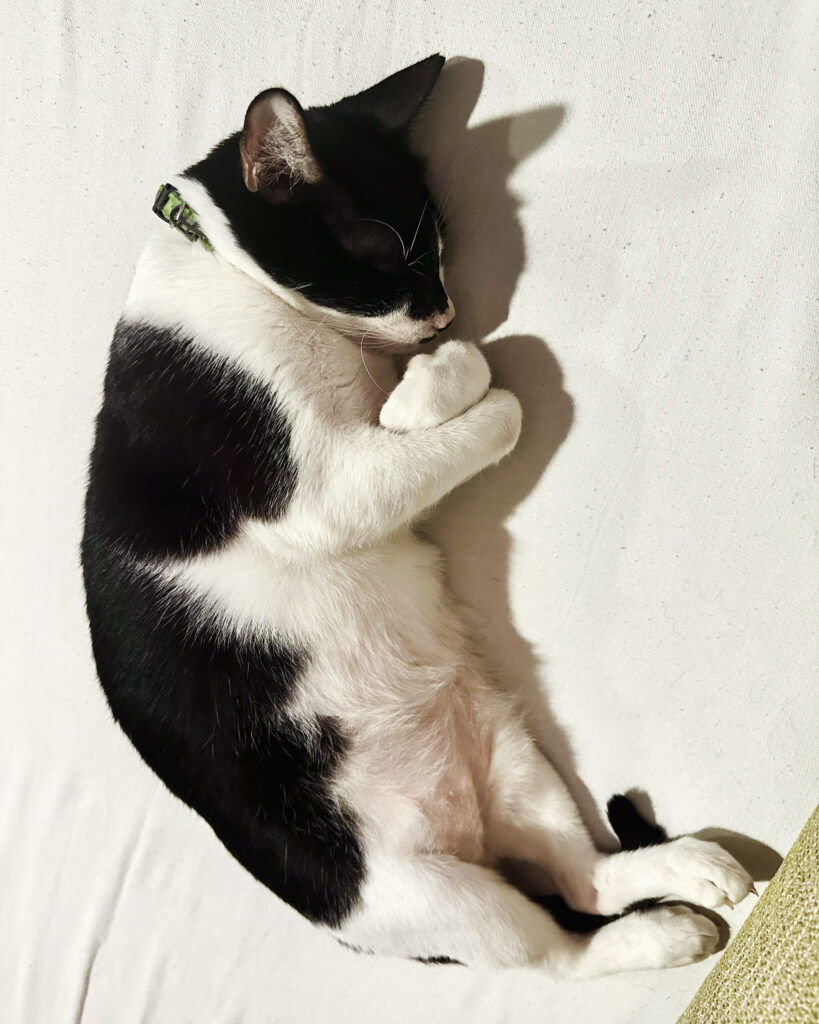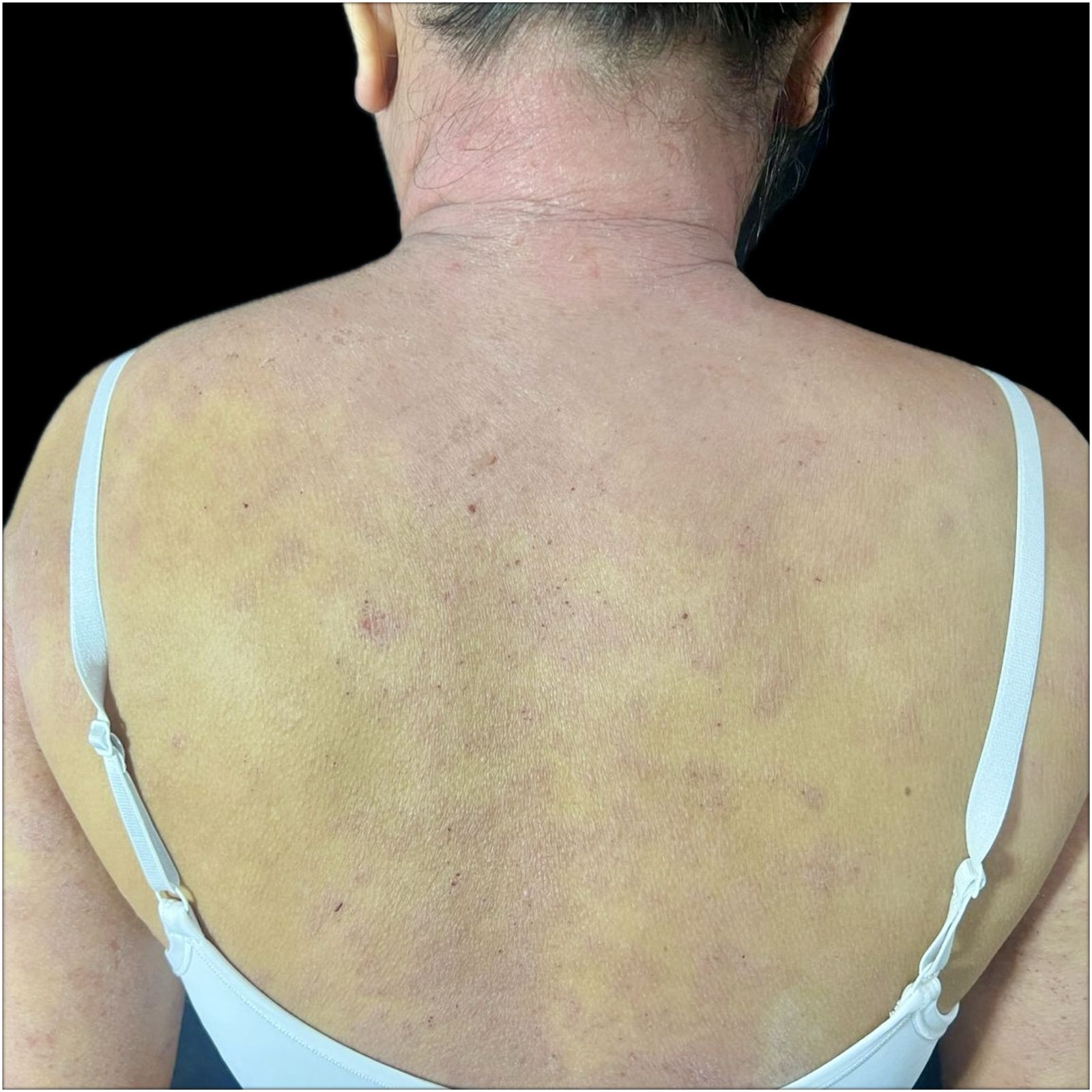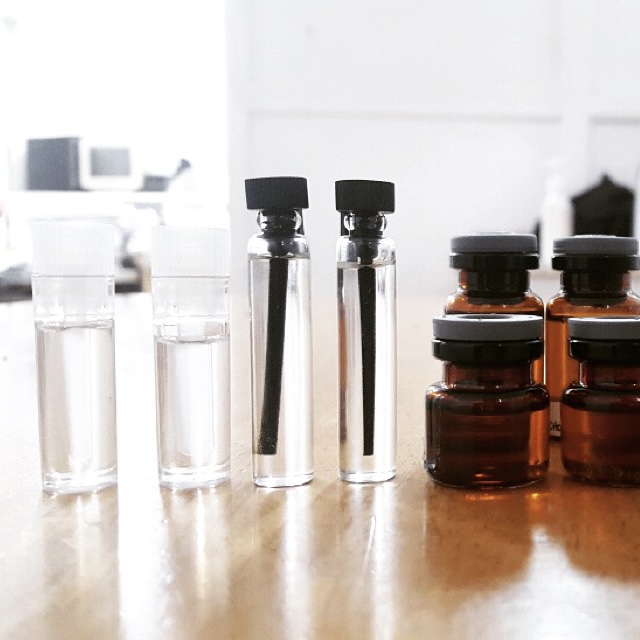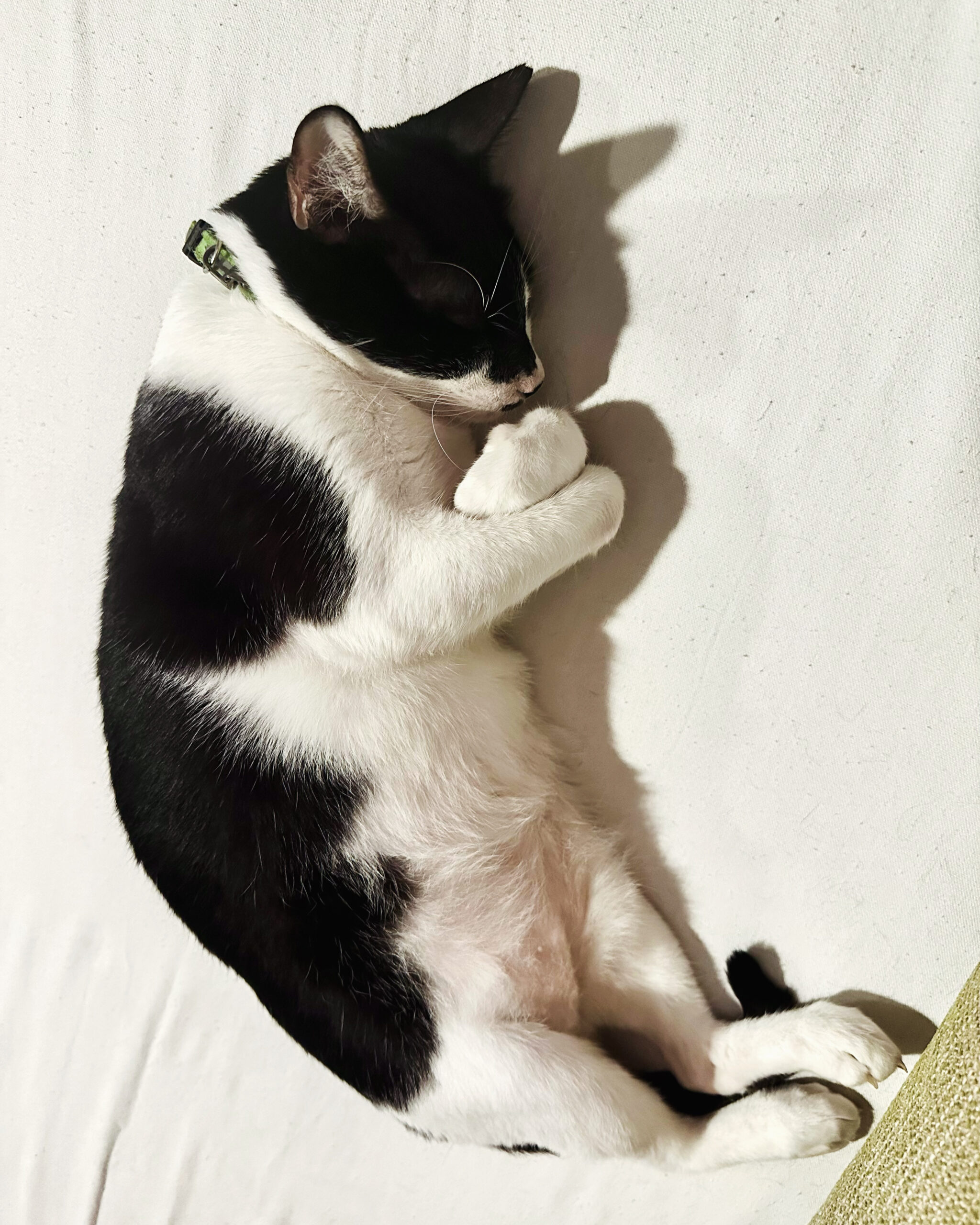Not An Allergen … But Quite Bad for Skin
Anxiety
If anxiety could be put in a patch test, we bet it would make the top of published allergen lists quickly — it’s quite common (the World Health Organization calls “anxiety disorders … the world’s most common mental disorders”) and triggers lots and lots of reactions.
Stress and anxiety have very similar symptoms (irritability or anger, tightness, muscle tension, trouble concentrating and sleeping, tummy issues). Stress is usually a response to a threat or trigger and tends to be short term. Anxiety can be partly caused by stress but can linger, even when the immediate threat is no longer present or even without an obvious trigger.
Anxiety doesn’t need to be a contact allergen to be troublesome. Anxiety (as well as stress and depression) is damaging to skin as is, enough so that psychodermatology is a growing specialty.
Your brain, your skin, and anxiety
There is a powerful brain-skin connection (the “feedback mechanisms and crosstalk between the brain and the skin”) — this review explores it in detail. The skin both perceives stress and is a target of stress: “Skin mast cells are activated by stress, and in turn they also produce stress hormones and inflammatory factors. This could lead to a vicious cycle of stress-induced inflammatory events.” While the review focused on how “chronic stress can have a detrimental effect on skin aging,” a growing body of research shows how stress, depression, and anxiety can affect the skin in many more ways besides aging.
One example is this report on psychodermatology which emphasizes: “It is well-established that psychological comorbidities are present in more than one-third of dermatological patients.” Another large study done with 3,635 patients from dermatological clinics in multiple countries showed “a significantly higher prevalence of clinical depression (10.1% vs. 4.3%), anxiety disorder (17.2% vs. 11.1%), and suicidal ideation (12.7% vs. 8.3%) among patients with common skin diseases compared with controls.”
If you have anxiety, there’s a pretty good chance it can affect your skin; and if you have skin concerns, they can contribute to anxiety.
Some of the ways stress can affect your skin:
- When stress levels rise, so does inflammation, increasing the likelihood of activity and flares in inflammatory skin conditions such as acne, psoriasis, rosacea, lichen planus, and eczema.
- Some viral conditions such as herpes can also be triggered by stress.
- Skin can become drier in periods of high stress. Dry skin can develop barrier defect, which can lead to increased sensitivity and a higher risk of infection (microbes can enter cracks in the skin).
- A specific type of hair loss called telogen effluvium is caused by stress — psychological stress but also significant bodily stress such as from chemotherapy, childbirth, Covid 19 or another severe infection, a very high fever, metabolic conditions, extreme diets, or certain medications. In this occurrence, a major change or stressful situation can make your hair follicles enter the resting (telogen) stage.
- Stress can trigger nervous habits such as unconsciously picking at your skin, eyebrows, lashes, hair, nail beds, acne, or scabs, or biting your fingernails.
Some examples of how anxiety and skin health can enter into a negative cycle:
- Stress, depression, or anxiety can make it more difficult to stick to your healthy habits. You might begin sleeping less, doomscrolling more, skipping exercise, getting lax about your skin routine and hygiene, drinking alcohol, and making poorer food choices. All of this can negatively impact your mental health and contribute to skin and health problems, which in turn can make you feel worse, increase inflammation, and negatively impact your self esteem.
- Some skin conditions like acne, psoriasis, eczema, vitiligo, and acne are known to affect self esteem, which can potentially lead to trying more and more skincare and makeup products in the pursuit of camouflage or clarity. The more products used, the higher the risk of an allergic or irritant reaction, a flare, acne, and other skin problems … potentially negatively impacting self esteem.
- A stress response can make your skin feel like it’s burning, tingling, numb, or itching. As well, itching and discomfort can increase anxiety.
Don’t shrug it off: start prioritizing your mental health now
Prevention in the form of allergen avoidance (why a patch test is so important) and proper skincare is very beneficial for skin; prevention in the form of daily mental health practices can go a long way towards preventing escalating symptoms in your body, skin, and overall wellbeing.
One study involving 214 patients over two years demonstrated “a strong correlation between skin diseases and anxiety … psychological intervention for patients with skin diseases, especially young patients, is essential.”
Just as you shouldn’t wait for a major flare to occur to start caring for your skin, you shouldn’t wait until you’re older, or “when you have time,” or for your stress or anxiety to become debilitating to start prioritizing your mental health. It’s never too late to begin caring for your skin, body, or mental health … it’s also true that starting things later can be harder. So wherever you are, in whatever age or state of health, right now is the perfect time to begin prioritizing your mental health.
Some (of the many!) things that can help:
Focusing on your mental health should be as regular as brushing your teeth. Make it part of your daily hygiene, regular health practices, and medical checkup routines.
Techniques such as mindfulness, cognitive-behavioral therapy, and relaxation practices have shown promise in reducing stress-related skin conditions. Some things you can try include …
- Seek help from a professional. We put this first to emphasize that you do not need to be in severe crisis to begin talking to a therapist. Consider a psychodermatologist if you have access to one. These specialists focus on the interconnectedness of our psychological state and skin health. This interdisciplinary approach integrates psychological interventions with dermatological treatments to achieve better outcomes for patients. If you don’t have access to a psychodermatologist, a therapist, psychologist, or psychiatrist can be very helpful!
- Joining a group can be a great way to gain perspective, be reminded that you’re not alone, receive guidance from a trained professional, and get support from a community (which hits your “social fitness” goals, too; see below).
- Explore proven mindfulness practices:
- Keep a gratitude journal. This meta-analysis of sixty-four randomized clinical trials shows that “acts of gratitude can be used as a therapeutic complement for treating anxiety and depression and can increase positive feelings and emotions.” This practice can be very simple:
- Every night before going to bed, reach for your journal. It’s best to do this before bed because sleep is when learning is cemented.
- List at least 3 things (can be more, but never less) that you’re grateful for that day.
- That’s it!
- Meditate. There is a growing number of studies like this one that show the efficacy of meditation in reducing stress and anxiety. A free app like Insight Timer can help you get started.
- Keep a gratitude journal. This meta-analysis of sixty-four randomized clinical trials shows that “acts of gratitude can be used as a therapeutic complement for treating anxiety and depression and can increase positive feelings and emotions.” This practice can be very simple:
- Be purposeful about your overall health. Pretty much everything you do for your overall health can help your mental health and your skin … and vice versa (creating a positive cycle!):
- Get 7-8 hours of sleep (melatonin, a great anti-inflammatory and antioxidant might be an option for you; ask your doctor)
- Prioritize good nutrition: cut out ultraprocessed foods as much as you can and opt for fresh veggies, fruit, and healthy proteins. Choose whole, brown or wild versions of rice and multigrain breads. Try coconut sugar instead of white sugar.
- Manage your social media mindfully (this technology is designed to be addictive and associated with mental health problems including anxiety and depression):
- Use your phone to set limits for the time you spend on social media.
- “Curate your algorithm” by purposefully liking (and making favorites) social media accounts that share positive posts.
- Especially as you’re focusing on improving your mental wellness, do not view or engage with posts that elicit powerful emotions such as anger or hatred.
- Set a timer for how long you read or watch news accounts.
- Get active. Many studies show that exercise is highly beneficial for many reasons, including easing symptoms of anxiety and other mental health concerns. High intensity exercise seems to be more beneficial for managing mental wellness. If you cannot do intense exercise, talk to your health care provider about what type of exercise you can do (any exercise is often better than none!)
- Use fragrance-free, dye-free, paraben-free, preservative-free, allergen-free skincare and makeup. In addition to not stressing the skin and hair, such products can reduce the risk of triggering skin problems … which can, in turn, contribute to improved mood and self-confidence, reinforcing a positive cycle of skin health.
- Telogen effluvium (hair loss from stress) is normally temporary. In over 90% of cases, telogen effluvium resolves itself when the stress subsides: hair begins to grow again in about three to six months without any treatment. Still, it helps to keep the follicles themselves less stressed. Consider an ultra-gentle, allergen-free shampoo like Essence Clark Wash and Conditioner. Massage Know-It-Oil virgin coconut oil into the scalp, too!
- Strengthen your “social fitness”: deepen the connections of your important relationships and increase the diversity of your social connections.
- According to the famous Harvard Study of Adult Development (started in 1938 and one of the longest-running studies on happiness), the strongest determinant of happiness is positive relationships. As summarized by Robert Waldinger, Harvard professor of psychiatry and director of the study: “Contrary to what you might think, it’s not career achievement, money, exercise, or a healthy diet. The most consistent finding we’ve learned through 85 years of study is: Positive relationships keep us happier, healthier, and help us live longer. Period.” Check out this article for a helpful tool to appreciate your social relationships and see where you might need more or less balance and connection.
- Another large study on 50,000 people across 8 countries showed the importance of social diversity — it seems that nurturing more types of relationships may be even more important than spending more time with loved ones. This study established “a positive relationship between people’s social portfolio diversity and well-being, over and above people’s total time spent in social interaction, and total number of social interactions.” It further showed that the benefits of a diverse social network improved more aspects of health, including physical health: “Across datasets, we found that the relationship between social portfolio diversity and well-being was strongest on measures of subjective well-being (i.e., life satisfaction, quality of life) and weaker, though still significant, on measures of physical health (e.g., ratings of physical health, number of hospital stays) and discrete emotions (i.e., positive and negative emotion)” — emphases ours.
To summarize:
- The not-great news is that skin and mental health can create a negative cycle where anxiety and poor mental health can impact your skin … and skin issues can trigger stress and add to anxiety.
- The happy flip side is the positive cycle of skin health, mental health, and overall well being: improving your mental health (and getting healthier overall) benefits your skin, which can contribute to positive feelings, which can sustain better health overall.
Subscribe to VMVinSKIN.com and our YouTube channel for more hypoallergenic tips and helpful “skinformation”!
If you have a history of sensitive skin…
…don’t guess! Random trial and error can cause more damage. Ask your dermatologist about a patch test.
To shop our selection of hypoallergenic products, visit vmvhypoallergenics.com. Need help? Ask us in the comments section below, or for more privacy (such as when asking us to customize recommendations for you based on your patch test results) contact us by email, or drop us a private message on Facebook.
For more:
- On the prevalence of skin allergies, see Skin Allergies Are More Common Than Ever.
- For the difference between irritant and allergic reactions, see It’s Complicated: Allergic Versus Irritant Reaction.
- For the difference between food, skin, and other types of reactions: see Skin & Food Allergies Are Not The Same Thing.
- On the differences between hypoallergenic, natural, and organic, check out Is Natural Hypoallergenic? and this video in our YouTube channel.
- To learn about the VH-Rating System and hypoallergenicity: What Is The Validated Hypoallergenic Rating System?
Main References:
Regularly published reports on the most common allergens by the North American Contact Dermatitis Group and European Surveillance System on Contact Allergies (based on over 28,000 patch test results, combined), plus other studies. Remember, we are all individuals — just because an ingredient is not on the most common allergen lists does not mean you cannot be sensitive to it, or that it will not become an allergen. These references, being based on so many patch test results, are a good basis but it is always best to get a patch test yourself.
- Chen Y, Lyga J. Brain-skin connection: stress, inflammation and skin aging. Inflamm Allergy Drug Targets. 2014;13(3):177-90.
- Dalgard FJ, Gieler U, Tomas-Aragones L, Lien L, Poot F, et al. The psychological burden of skin diseases: a cross-sectional multicenter study among dermatological out-patients in 13 European countries. J Invest Dermatol. 2015 Apr;135(4):984-991.
- Jafferany, M. 2025. Special Report: Psychodermatology: Bridging Dermatology and Psychiatry. Psychiatric News, Volume 60, Number 3.
- Mento C, Rizzo A, Muscatello MRA, Zoccali RA, Bruno A. Negative Emotions in Skin Disorders: A Systematic Review. Int J Psychol Res (Medellin). 2020 Jan-Jul;13(1):71-86.
- Jafferany M. Psychodermatology: a guide to understanding common psychocutaneous disorders. Prim Care Companion J Clin Psychiatry. 2007;9(3):203-13.
- Sun C, Ren Y, Zhang W. Association between skin disease and anxiety: a logistic analysis and prediction. Ann Transl Med. 2023 Jan 31;11(2):115.
- Schut C, Mollanazar NK, Sethi M, Nattkemper LA, et al. Psychological Stress and Skin Symptoms in College Students: Results of a Cross-sectional Web-based Questionnaire Study. Acta Derm Venereol. 2016 May;96(4):550-1.
- Raap U, Werfel T, Jaeger B, Schmid-Ott G. Atopische Dermatitis und psychischer Stress [Atopic dermatitis and psychological stress]. Hautarzt. 2003 Oct;54(10):925-9. German.
- Medical News Today. (2023, January 27). What to know about anxiety and itching. https://www.medicalnewstoday.com/articles/anxiety-itching
- Diniz G, Korkes L, Tristão LS, Pelegrini R, Bellodi PL, Bernardo WM. The effects of gratitude interventions: a systematic review and meta-analysis. Einstein (Sao Paulo). 2023 Aug 11;21:eRW0371.
- Pascoe MC, Thompson DR, Jenkins ZM, Ski CF. Mindfulness mediates the physiological markers of stress: Systematic review and meta-analysis. J Psychiatr Res. 2017 Dec;95:156-178.
- Hoge EA, Bui E, Marques L, Metcalf CA, et al. Randomized controlled trial of mindfulness meditation for generalized anxiety disorder: effects on anxiety and stress reactivity. J Clin Psychiatry. 2013 Aug;74(8):786-92.
- Orme-Johnson DW, Barnes VA. Effects of the transcendental meditation technique on trait anxiety: a meta-analysis of randomized controlled trials. J Altern Complement Med. 2014 May;20(5):330-41.
- Fekete EM, Deichert NT. A Brief Gratitude Writing Intervention Decreased Stress and Negative Affect During the COVID-19 Pandemic. J Happiness Stud. 2022;23(6):2427-2448.
- Aylett E, Small N, Bower P. Exercise in the treatment of clinical anxiety in general practice – a systematic review and meta-analysis. BMC Health Serv Res. 2018 Jul 16;18(1):559.
- Sharma A, Madaan V, Petty FD. Exercise for mental health. Prim Care Companion J Clin Psychiatry. 2006;8(2):106.
- Collins, HK, Hagerty, SF, Quoidbach J, Nortin, MI, Brooks, AW. Relational diversity in social portfolios predicts well-being, Proc. Natl. Acad. Sci. U.S.A. 119 (43) e2120668119, https://doi.org/10.1073/pnas.2120668119 (2022).
- Schulz, M, Waldinger, R. “An 85-year Harvard study found the No. 1 thing that makes us happy in life: It helps us ‘live longer’.” CNBC Make It, February 10, 2023. https://www.cnbc.com/2023/02/10/85-year-harvard-study-found-the-secret-to-a-long-happy-and-successful-life.html. Accessed April 21, 2025.
- Mineo, Liz. “Good genes are nice, but joy is better.” The Harvard Gazette, April 11, 2017. https://news.harvard.edu/gazette/story/2017/04/over-nearly-80-years-harvard-study-has-been-showing-how-to-live-a-healthy-and-happy-life/. Accessed April 21, 2025.
- DeKoven JG, Warshaw EM, Reeder MJ, et al. North American Contact Dermatitis Group Patch Test Results: 2019-2020. Dermatitis. 2023 Mar-Apr;34(2):90-104. doi: 10.1089/derm. 2022.29017.jdk. Epub 2023 Jan 19. PMID: 36917520.
- Uter W, Wilkinson SM, Aerts O, et al. ESSCA and EBS ESCD working groups, and the GEIDAC. Patch test results with the European baseline series, 2019/20-Joint European results of the ESSCA and the EBS working groups of the ESCD, and the GEIDAC. Contact Dermatitis. 2022 Oct;87(4):343-355. doi: 10.1111/cod.14170. Epub 2022 Jun 24. PMID: 35678309. https://pubmed.ncbi.nlm.nih.gov/35678309/
- DeKoven JG, Silverberg JI, Warshaw EM, Atwater AR, et al. North American Contact Dermatitis Group Patch Test Results: 2017-2018. Dermatitis. 2021 Mar-Apr 01;32(2):111-123.
- DeKoven JG, Warshaw EM, Zug KA, et al. North American Contact Dermatitis Group Patch Test Results: 2015-2016. Dermatitis. 2018 Nov/Dec;29(6):297-309.
- DeKoven JG, Warshaw EM, Belsito DV, et al. North American Contact Dermatitis Group Patch Test Results 2013-2014. Dermatitis. 2017 Jan/Feb;28(1):33-46.
- Warshaw, E.M., Maibach, H.I., Taylor, J.S., et al. North American contact dermatitis group patch test results: 2011-2012. Dermatitis. 2015; 26: 49-59.
- W Uter et al. The European Baseline Series in 10 European Countries, 2005/2006–Results of the European Surveillance System on Contact Allergies (ESSCA). Contact Dermatitis 61 (1), 31-38.7 2009.
- Wetter, DA et al. Results of patch testing to personal care product allergens in a standard series and a supplemental cosmetic series: An analysis of 945 patients from the Mayo Clinic Contact Dermatitis Group, 2000-2007. J Am Acad Dermatol. 2010 Nov;63(5):789-98.
- Warshaw EM, Buonomo M, DeKoven JG, et al. Importance of Supplemental Patch Testing Beyond a Screening Series for Patients With Dermatitis: The North American Contact Dermatitis Group Experience. JAMA Dermatol. 2021 Dec 1;157(12):1456-1465.
- Verallo-Rowell VM. The validated hypoallergenic cosmetics rating system: its 30-year evolution and effect on the prevalence of cosmetic reactions. Dermatitis 2011 Apr; 22(2):80-97.
- Ruby Pawankar et al. World Health Organization. White Book on Allergy 2011-2012 Executive Summary.
- Misery L et al. Sensitive skin in the American population: prevalence, clinical data, and role of the dermatologist. Int J Dermatol. 2011 Aug;50(8):961-7.
- Warshaw EM1, Maibach HI, Taylor JS, Sasseville D, DeKoven JG, Zirwas MJ, Fransway AF, Mathias CG, Zug KA, DeLeo VA, Fowler JF Jr, Marks JG, Pratt MD, Storrs FJ, Belsito DV. North American contact dermatitis group patch test results: 2011-2012.Dermatitis. 2015 Jan-Feb;26(1):49-59.
- Warshaw, E et al. Allergic patch test reactions associated with cosmetics: Retrospective analysis of cross-sectional data from the North American Contact Dermatitis Group, 2001-2004. J AmAcadDermatol 2009;60:23-38.
- Marks JG, Belsito DV, DeLeo VA, et al. North American Contact Dermatitis Group patch-test results, 1998 to 2000. Am J Contact Dermat. 2003;14(2):59-62.
- Warshaw EM, Belsito DV, Taylor JS, et al. North American Contact Dermatitis Group patch test results: 2009 to 2010. Dermatitis. 2013;24(2):50-99.
- Verallo-Rowell V. M, Katalbas S.S. & Pangasinan J. P. Natural (Mineral, Vegetable, Coconut, Essential) Oils and Contact Dermatitis. Curr Allergy Asthma Rep 16,51 (2016) . https://doi.org/10.1007/s11882-016-0630-9.
- de Groot AC. Monographs in Contact Allergy, Volume II – Fragrances and Essential Oils. Boca Raton, FL: CRC Press Taylor & Francis Group; 2019.
- De Groot AC. Monographs in Contact Allergy Volume I. Non-Fragrance Allergens in Cosmetics (Part I and Part 2). Boca Raton, Fl, USA: CRC Press Taylor and Francis Group, 2018.
- Zhu TH, Suresh R, Warshaw E, et al. The Medical Necessity of Comprehensive Patch Testing. Dermatitis. 2018 May/Jun;29(3):107-111.
Want more great information on contact dermatitis? Check out the American Contact Dermatitis Society, Dermnet New Zealand, the Contact Dermatitis Institute, and your country’s contact dermatitis association.

Laura is our “dew”-good CEO at VMV Hypoallergenics and eldest daughter of VMV’s founding dermatologist-dermatopathologist. She has two children, Madison and Gavin, and works at VMV with her family and VMV’s signature “skinfatuated, skintellectual, skingenious” team. In addition to saving the world’s skin, Laura is passionate about health, cultural theory, human rights, happiness, and spreading goodness (like a VMV cream)!







